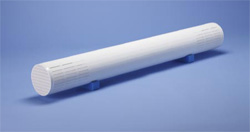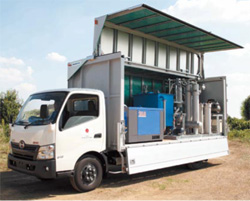Home > Highlighting JAPAN > Highlighting Japan JANUARY 2013 > Fresh Water on Wheels
Highlighting JAPAN
[SERIES] SCIENCE & TECHNOLOGY
Fresh Water on Wheels
The world today is facing issues such as serious water shortages and water pollution owing to the rapid population increase and economic growth in rising economies. Mobile water purification equipment developed in Japan could help to resolve these issues. Takashi Sasaki reports.

Ceramic membrane filtration
Credit: COURTESY OF METAWATER
Already a precious commodity, rapid population increase, primarily in developing countries, and economic growth in rising economies are causing pronounced water shortages as well as pollution. According to "Global Drinking Water Trends" released by UNICEF and the World Health Organization (WHO) in 2012, 780 million people are unable to obtain safe drinking water. Water shortages and pollution exacerbate poverty and disease. Water issues are particularly serious in developing countries, where many regions have yet to establish tap water systems.
Metawater Co., which is based in Tokyo, has developed mobile water purification equipment to supply safe drinking water to these regions.
Metawater is a company that develops, designs, manufactures and operates tap water/sewage systems and plants for recycling.
"European nations have developed water purifiers that are car-mountable, but these devices use polymer membranes for their filtration systems. We use ceramic membranes," says Hironori Shimada, director of the company's International Center. "They are characterized by greater durability and easier maintenance when compared with polymer membranes. In addition, we load the generator, pump, compressor and everything else needed to run the purifier onto one truck, so the only thing required is a river, lake or pond to produce drinking water, even in places without electricity."
Some people may associate ceramic membranes with sheet-type filters, but Metawater's ceramic membrane takes a cylindrical shape with a diameter of 180 mm and a length of 1.5 m (1 m for mobile type). It contains numerous water ducts, and by applying pressure, water passes through the porous ceramic layers in the cylinder and seeps out to its outer perimeters as clean water. The minute pores of the ceramic layer measure a mere 0.1 microns. This serves as a membrane to filter out mud and waste as well as bacteria such as E. coli and dangerous protozoa.

A truck fitted with the mobile ceramic membrane filtration equipment
Credit: COURTESY OF METAWATER
For around the last twenty years, research has been undertaken into ceramic membrane technology as the filtration system for water purification plants nationwide. Metawater's forerunner was a manufacturer of ceramic insulators for utility poles and pylons. Founded in 1919, the company incorporates its century-long product manufacturing tradition into advanced ceramics technology.
"Purifiers that use polymer membranes cannot be used with highly turbid water such as river water after heavy rain. Ceramic membranes, on the other hand, are strong and do not wear even in the toughest conditions, and can produce mass volumes of water amounting to 50–70 cubic meters a day using two one-meter long membranes. Furthermore, waste adhering to the membranes can be washed out simply with washing water and air, so it requires no tedious maintenance. It even runs on low power," explains Satoshi Hata of the company's International Center. According to Hata, if every village had a simple water storage tank, then a purifier-equipped truck need only run regular services to each village to provide a stable supply of drinking water to a wide area.
Metawater, with the receipt of grant aid from the Japanese government, plans to deliver a total of eight units of its mobile water purification equipment to the Republic of Malawi, the Republic of Kenya and the Togolese Republic starting early 2013. The units are largely expected to play a role in farming regions without tap water systems. The company has also received inquiries from Vietnam, Cambodia and other Southeast Asian nations, as well as from local autonomies within Japan that are considering using the units as water stations in regions hit by earthquake and typhoon disasters.
© 2009 Cabinet Office, Government of Japan






